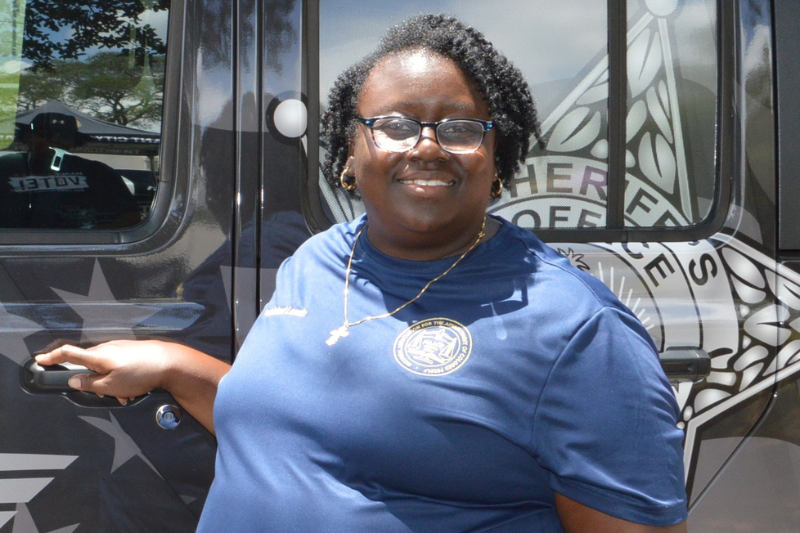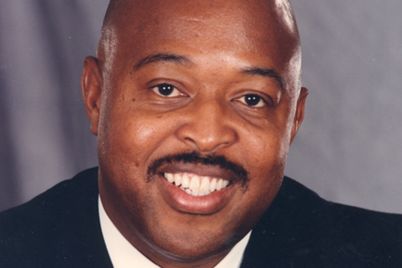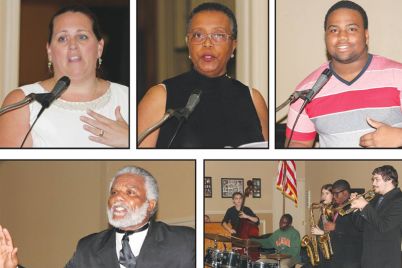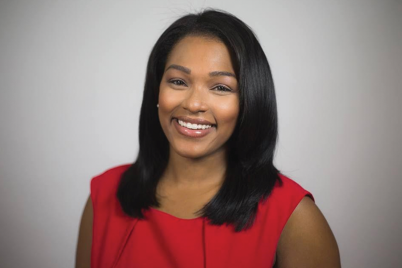Like many in the Bay area, Yvette Lewis was surprised to discover that the final resting place of some local African Americans have been lost or erased.
BY FRANK DROUZAS, Staff Writer
TAMPA — The African American Burial Ground & Remembering Project is an ongoing USF research study that addresses the erasure of historic Black cemeteries in the Tampa Bay area. Awarded a USF Blackness and Anti-Black Racism grant in 2020, it consists of faculty, staff, and students from multiple disciplines across USF St. Pete and Tampa campuses.
The project focuses on activities to identify, interpret, preserve, record, and memorialize previously unmarked, erased, abandoned, and underfunded African-American burial grounds in Florida, with a focus on Tampa’s Zion Cemetery (located beneath Robles Park Village) and St. Petersburg’s Oaklawn, Evergreen and Moffett cemeteries (located beneath a Tropicana Field parking lot and I-275).
Like many in the Bay area, Yvette Lewis was surprised to discover that the final resting place of some local African Americans have been lost or erased.
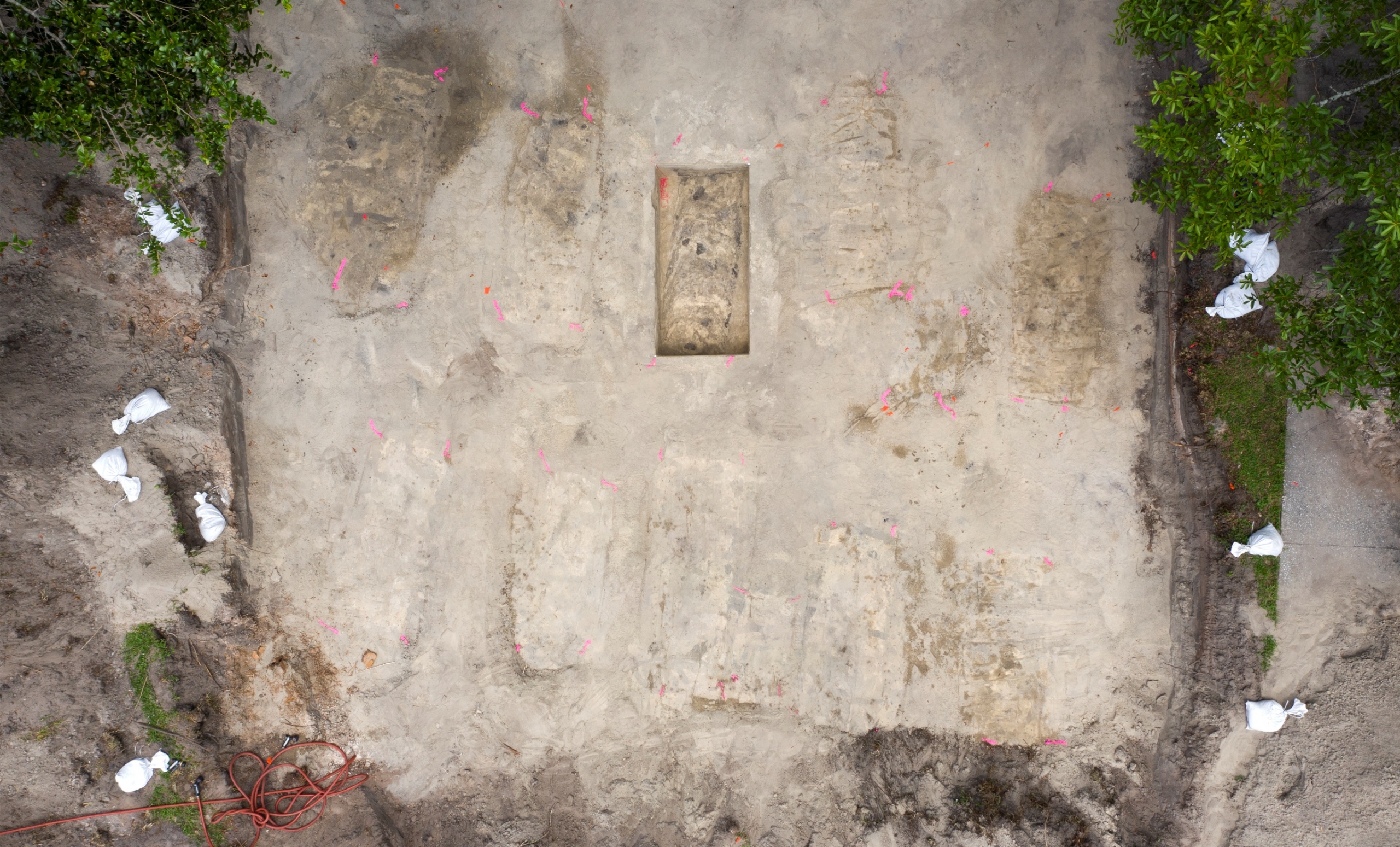
Aerial images of the scanned grounds and images from the ground-penetrating devices showing outlines of coffin-shaped structures in Tampa.
Lewis, head of the Hillsborough County NAACP, met with a reporter from the Tampa Bay Times who was investigating the disappearing burial places. A few such cemeteries have been discovered throughout the area — where remains were unceremoniously displaced, graves built over or headstones removed — including Zion Cemetery in Tampa.
“First I was in disbelief, and I was like, ‘No, it just really can’t be true,’” she recalled. “You know, then I was in shock. You go through all of the emotions.
Lewis said the Hillsborough County NAACP is assisting the Zion committee — formed by the Tampa Housing Authority — and making some decisions to give the people a proper memorial and proper resting place. They meet once a month and include representatives of elected officials, like Congresswoman Kathy Castor and community members. Lewis doesn’t believe the committee, which she is on, is making enough progress, however.
“The City of Tampa pretty much has never embraced…I think they did acknowledge that it was there, but they have never really embraced the whole thing and said, ‘You know, let me right this wrong, let me jump in, let me do something.’ They’ve never done anything like that, which makes it difficult with the committee because you really need everyone’s input to help with this because we didn’t do this. The City of Tampa did this.”
Though the Tampa Housing Authority has assembled a memorial, Lewis believes more should be done. To Lewis’s knowledge, Mayor Jane Castor has only attended one committee meeting and has not made any public apology concerning Zion Cemetery on behalf of the city.
“I understand that she didn’t do this, but I do know that the City of Tampa did do this,” Lewis asserted, adding that the city is responsible for covering up the fact that there are missing graves.
Robles Park in Tampa is the site of the city’s first-ever African-American cemetery, and in 2019 ground penetrating radar discovered over 100 coffins beneath an apartment complex there. Lewis explained that the Tampa Housing Authority wanted to develop the property and moved everyone out, and they claimed the people had an opportunity to come back.
“They always say that, but they never do…they were planning on tearing down Robles Park anyway,” Lewis said. “So, the people were going to be displaced. Honestly, they don’t want Black folks — common Black folks — to live over there. They want to develop that into a beautiful piece of land that white people will reap the benefits off our misery and suffering. So, they are just hurt, and they’re upset that they found a cemetery.”
Some of the designs that architects are coming up with for those grounds are disrespectful, Lewis said.
“They want to put a park bridge out there and a walking trail out there,” she said. “So, if these people have been walked on, buildings on them, why would you want to put a walking trail out there?… So, then they came back with another design where we’re going to put a river, a river going to run through it. So, you’re going to put a river where these people, once again, where their loved ones laid them to rest?”
Lewis believes they are more concerned about the ability to gentrify and profit from it.
What she would like to have done to honor the Zion Cemetery and African-American history in Tampa is to see an open field and have the markers up there where the graves are. That way, people could see that it is a cemetery, Lewis said. On one of the corner pieces of land, there could be a center that tells the story, and “turn that center into a genealogy center where people can go and research their genealogy. Their loved ones, their ancestors.”
“Because, see, this cemetery was not lost. It was forgotten about and back then, Black folks couldn’t discuss it, or they couldn’t bring it up because they were afraid to challenge,” Lewis said, adding that she has brought her ideas up to the committee.
There have been other burial ground discoveries in Tampa in which Lewis is involved, including one at Kings High School (Ridgewood) and one in Port Tampa.
“The one at King High School, Ridgewood, they’re in the process now with the architect, once again, designing a memorial. And putting up—they’re in the process of designing one for that committee as well,” she said, noting that she is on that committee as well.
Lewis stoutly believes that the City of Tampa needs to correct this part of history and the “injustice that was done.”
“Everything was just covered up, you know,” she said. “The land was resold at — for Ridgewood over there where King High School is — the land was taken over there at Port Tampa and given to the military; they took it by eminent domain, so they knew what they were doing at all times.
“So why do we have to continue to go through this? We shouldn’t have to force their hand to say you’re sorry or, ‘We’re going to fix this.’ They should be ready to jump in, but what we get is nothing, and the wounds are there; these souls have not rested.”
Cheryl Rodriguez interviewed Yvette Lewis on Feb. 22, 2021.

